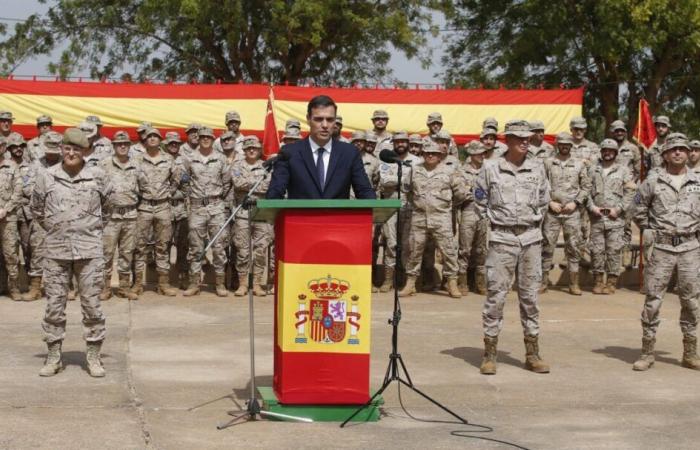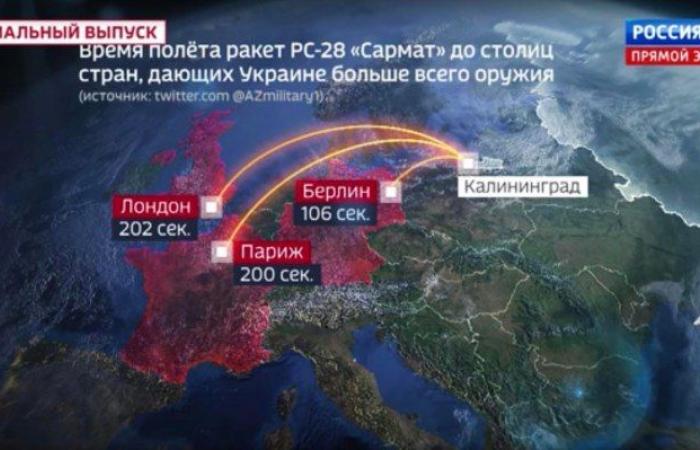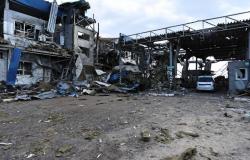2
As the conflict in Ukraine escalates and Vladimir Putin becomes more threatening than ever, global armed conflict is not ruled out. In the event of war, what would be the situation in Spain? Elements of response.
Cover photo: (efe)
Can Spain be hit by a missile from Russia?
Russian President Vladimir Putin recently approved a new nuclear doctrine authorizing the use of nuclear weapons in response to conventional attacks threatening Russian sovereignty following a Ukrainian attack on Russian soil.
2,700 km separate Madrid from Eastern European countries such as Poland or Finland, on red alert in the face of an extension of the conflict. The governments of these countries are preparing their populations for war by distributing practical instruction manuals, while Russian state television has broadcast footage simulating nuclear attacks on several European countries, illustrating a possible Kremlin response to the NATO.
A recent Russia-1 broadcast aired a map with capital cities marked in red as potential targets for Russian nuclear attacks. We find Berlin, Warsaw, Prague, Bucharest and Paris. Spain did not appear on the attack map although the presenter claimed that “all European capitals were threatened”.
Furthermore, the radioactivity laboratory of the University of Coimbra, in Portugal, has raised the possibility that the explosion of a nuclear bomb in central Ukraine could have repercussions even on the Iberian Peninsula. The experts, however, wanted to reassure: the impact would be limited to direct explosive effects, excluding the prospect of a “nuclear winter”.
Can citizens living in Spain be called to arms?
Article 30 of the Spanish Constitution states in its first paragraph that “The Spaniards have the right and the duty to defend Spain”.
Its fourth paragraph adds: “By law, the duties of citizens may be regulated in the event of serious danger, catastrophe or public calamity”which notably includes a war context. Among the laws mentioned in this article of the Constitution is the Royal Decree on the National Security Strategy of 2021. This text states that “the culture of National Security constitutes an important complement to the development and consolidation of the National Security Policy, because social awareness contributes to strengthening the resilience of society and the State”.
In theory, massive mobilization remains possible in the event of a major conflict. However, this eventuality would require legislative changes and a clear political will, beyond the current frameworks. The government now favors actions based on awareness and voluntary participation, thus strengthening society's resilience in the face of external threats.
Can Spain restore compulsory military service?
Spain has no longer imposed compulsory military service since 2001. However, Article 30 mentions that “the law will establish the military obligations of Spaniards and will regulate, with the necessary guarantees, conscientious objection and other reasons for exemption from military service, being able to require, where appropriate, a substitute social benefit”.
Conscientious objection is regulated by Spanish law. It recognizes that citizens who, for religious, ethical, moral or philosophical reasons, refuse to participate in military activities may be exempt, provided they perform a social service in lieu of armed service.
Thus, while Spain remains legally able to order military service in times of war, this option is not explicitly considered in the current framework. Such a decision would require in-depth debates and citizen support for exceptional mobilization
Does Spain have the means to defend itself?
The Spanish Armed Forces have approximately 120,000 military personnel in active service. Concerning the defense budget, Brussels' objective lies in military investment by Member States at a minimum of 2% of GDP. The average is currently 1.85%. In Spain, 1.3%. However, socialist Prime Minister Pedro Sánchez wants to catch up.
This year, Madrid increased its military budget by 19.3%. This is the 3rd largest increase after Sweden (+30.1%) and Lithuania (+27.6%), two countries placed in the most at-risk area due to geographical proximity to Russia.
In the southern axis, mentally and physically removed from the risk of invasion, Spain is the only nation to boost its army. France, Italy and Portugal are not experiencing the same effort with a respective increase in the military budget of 0.7, 2 and 0.1%. Despite President Macron's martial declarations, France only devotes 1.8% of its GDP to its defense.
Shelter infrastructure in Spain: gaps in the face of modern threats
When it comes to protective infrastructure, Spain has underground shelters and defensive structures built during the Civil War and World War II. However, much of this infrastructure is now obsolete and unsuitable for modern security and habitability standards needed in the event of a major conflict.
Unlike countries like Ukraine, Spain has not invested in modernizing these shelters, mainly built in the 1930s and 1940s. Today, they would be completely ineffective against nuclear, biological or chemical threats.
Unlike countries like Switzerland, which has modern infrastructure to shelter its entire population, Spain has not adopted similar measures. In Switzerland, the law requires the inclusion of shelters in all new constructions and guarantees their regular maintenance. In Spain, no comparable legislation exists, and no recent government has launched a significant program to build or upgrade shelters for civil protection in the event of war.
Does the Spanish population take the risk of a new world war seriously?
Yes. 57% of Spaniards questioned consider it likely that a third world war will break out in the next thirty years, compared to 31% who reject this idea, according to a survey entitled « Incommunication, communication and communications »led by the independent forum Periodismo 2030 in collaboration with the AXA Foundation and Metroscopia.
Furthermore, 70% of the 3,000 participants in this survey predict that cyberattacks could paralyze major economic sectors in the future. This figure reflects the growing fear of digital vulnerabilities in an increasingly connected world. Finally, half of those surveyed believe that democracy, as we know it today, will be replaced by other systems by the middle of the century.







